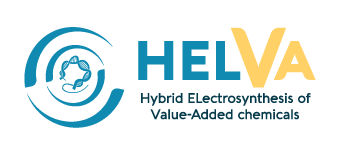Electrosynthesis of acetate from CO2 with high efficiency and selectivity
Carbon-based molecules drive the industries shaping our daily lives—from construction and automotive to electronics, pharmaceuticals, textiles, and more. However, the conventional methods of obtaining these crucial molecules involve fossil fuels and energy-intensive processes, contributing to greenhouse gas emissions and hindering the transition to sustainable circular economies.
The urgent need for alternatives has led HELVA to focus on upgrading waste CO2 into value-added chemicals using renewable energy. This includes the promising technology of CO2 electroreduction (CO2R), capable of generating small molecules for fuel and chemical feedstock. While CO2R has shown success in producing smaller molecules (C1, C2), creating larger, higher energy density molecules (C4+) remains a challenge.
HELVA addresses this gap through a tandem approach, combining CO2R systems and microbial bio-upgrade. By designing systems that optimize acetate output, our hybrid approach aims to achieve technoeconomic viability for sustainable plastics. HELVA stands at the forefront of change, offering an innovative solution that reimagines the synthesis of complex carbon-based materials.
HELVA is committed to advancing the science and technology of CO2 electrochemical and biological utilization and conversion. Our specific objectives include:

 Project HELVA was selected in the Joint Transnational Call 2022 of M-ERA.NET 3, which is an EU-funded network of about 49 funding organisations (Horizon 2020 grant agreement No 958174). The project is funded by the Agencia Estatal de Investigación (AEI, Spain); National Science Centre (NCN, Poland); São Paulo Research Foundation (FAPESP, Brazil).
Project HELVA was selected in the Joint Transnational Call 2022 of M-ERA.NET 3, which is an EU-funded network of about 49 funding organisations (Horizon 2020 grant agreement No 958174). The project is funded by the Agencia Estatal de Investigación (AEI, Spain); National Science Centre (NCN, Poland); São Paulo Research Foundation (FAPESP, Brazil).